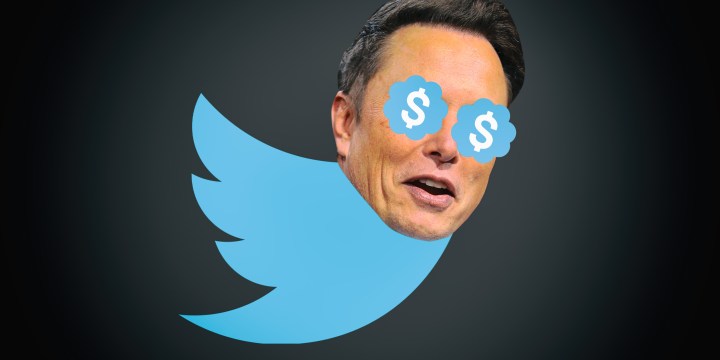AFTER THE BELL
Welcome, Twitter users, to a free-for-all hellscape

Elon Musk obviously bought Twitter partly because he loves being on it and the aggrandising process of venting his views, as so many people do. But being the CEO entails responsibilities that go further than being a cheerleader for the views of his right-wing bros.
I’ve provided sage advice before in this column to Elon Musk, gently suggesting that he should not buy Twitter.
For a moment, he appeared to be taking my advice. Then he abruptly changed his mind at the courtroom door, where the odds were stacked against him. He took over last weekend and promptly fired a whole bunch of people. But this past week has been a complete hellscape, and I am even more convinced it is all going to end in tears. I could be wrong; Musk is resourceful and smart — he could pull it out of the hat. But you can’t help thinking someone is going to start drawing lettuce comparisons pretty soon.
The word ‘hellscape’ is particularly apposite (in case you haven’t been reading the fine print) because Musk has tried to reassure advertisers during the week that Twitter “cannot become a free-for-all hellscape, where anything can be said with no consequences!”.
Musk felt it necessary to make this clear since he has described himself as a “free speech absolutist” and said he would probably allow former President Donald Trump back on the site.
Read in Daily Maverick: “Five Things Elon Musk Wants to Change About Twitter Right Away”
For advertisers, Twitter is a big headache. It’s popular, but the one thing advertisers do not want is for their adverts to end up being published next to some racist rant, for example. So all the social media sites, including Twitter, have introduced measures to enhance what is known in the industry as “brand safety”.
Ad agency Omnicom Media actually rates the brand safety measures introduced by the social media organisations, and surprise! Twitter is the worst. In a letter to advertisers, Musk said that Twitter aspires to be the most respected advertising platform in the world. It’s worth noting that advertising accounted for 89% of Twitter’s $5.08-billion revenue in 2021.
Part of the problem is that Twitter is, almost by design, a platform for the outspoken, the opinionated, and, sadly, the hateful. Proof? Something called the Network Contagion Research Institute tweeted data on Friday showing that the use of the N-word on Twitter had jumped by 500% in the previous 12 hours. You have to guess that is at least in part because of Musk’s absolutist comment.
And then Musk himself really, really put his foot in it. In an argument with Hillary Clinton, he tweeted a link to an internet post speculatively calling into question what happened in the violent Friday morning attack on the husband of House Speaker Nancy Pelosi.
“There is a tiny possibility there might be more to this story than meets the eye,” Musk tweeted.
The link was to the Santa Monica Observer, which claimed, falsely, that Paul Pelosi’s attacker was in a same-sex relationship with him and they’d had a drunken quarrel. Because that wasn’t salacious enough, the story said people found both men in their underwear when the police arrived. In fact, the FBI complaint against alleged attacker David DePape quotes a witness saying he was dressed all in black and carried a large black bag on his back. DePape’s motivation for the attack was obviously political, given his posts on YouTube and Facebook, something police confirmed.
Visit Daily Maverick’s home page for more news, analysis and investigations
Musk, who has some 113 million followers, later deleted the tweet, but not before more than 80,000 people “Liked” it. What does this mistake tell you? Actually, a lot. First, and this is an argument I’ve had with non-media people for decades, freedom of speech is not equivalent to telling the truth. Although the lack of freedom of speech almost certainly guarantees that the truth will not be told, the mere existence of freedom of speech doesn’t necessarily achieve the opposite.
Telling the truth is extremely hard. Let me say that again. Telling the truth is extremely hard. It’s hard, because the first thing you have to do to tell the truth is set aside your own prejudices. And for that you need to know what your prejudices are, but most people are extremely attached to their prejudices and don’t give them up easily. And just by the way, that includes me, but at least I know I need to examine my priors.
In this case, Musk, who clearly despises Clinton, was so keen to give the former presidential candidate a figurative snotklap, he didn’t notice that the story he was retweeting was transparently horse manure. If he had, for example, googled the Santa Monica Observer, he might have noticed the publication previously claimed Clinton was dead and that a body-double debated Donald Trump. And other stuff.
Musk obviously bought Twitter partly because he loves being on it and the aggrandising process of venting his views, as so many people do. But being the CEO entails responsibilities that go further than being a cheerleader for the views of his right-wing bros.
Although I just love what Musk has done in making electric cars, underground tunnels, rocketry and international internet provision, tech writer Nilay Patel captured the issue wonderfully in The Verge in an article titled: “Welcome to hell, Elon.” He makes the point that Twitter’s problems are not engineering problems. They are political problems.
“Twitter, the company, makes very little interesting technology; the tech stack is not the valuable asset. The asset is the user base: hopelessly addicted politicians, reporters, celebrities, and other people who should know better but keep posting anyway. You! You, Elon Musk, are addicted to Twitter. You’re the asset. You just bought yourself for $44 billion dollars.” Ha ha, as they say.
Musk’s ascension to the role of Chief Twit throws up all kinds of problems for existing users, who will soon have to decide whether it’s worth paying $8 a month for the joy of having a blue tick next to their name. I’m one of those people, and I’m telling you now, I respectfully decline. As writer Stephen King pointed out, most big content providers are the ones getting paid by the platform to be on it — not the other way around.
Twitter’s business model is simple: other people create the content; we collect the money. Twitter is now the only large social media platform that does not pay its prime content creators.
Maybe Musk can swing it — I don’t know. He has pulled off more unlikely turnarounds before. So good luck to him with this one. In the meantime, do have fun in the hellscape; I’ll be on Reddit, we can bump there maybe. And as Patel pointed out, don’t forget, this was your idea. DM/BM

















For someone always whining about having been bullied at school, he’s become the bully (with a god complex). Twitter can only go one way with this right wing egomaniac at the helm. I deactivated my account yesterday.
You leaving is equal to editing or sanitising the content you wish to be exposed to. Imagine if we all lived in such silos?
Lot of wisdom and sanity to be found in managing what we’re exposed to … Mental health 101 in our crazy world.
Interesting point – one that should receive more scrutiny in my view, is the fact that content creators get paid. Truth doesn’t always sell well. So how do we ensure that content creators stick to the „truth“?
Stop acting like snowflakes people. You will never grow or develop if you’re not exposed to some differing viewpoints… I will not bet against Elon